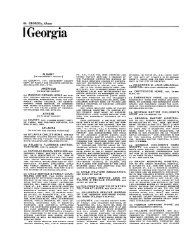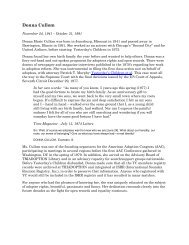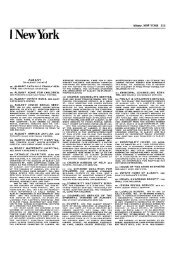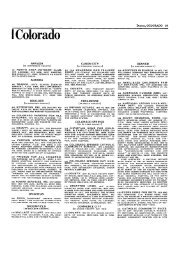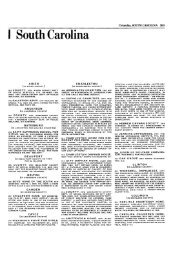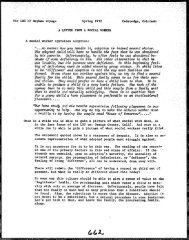Articles Book III - Pg 300-560 (Birthparents) - triadoption
Articles Book III - Pg 300-560 (Birthparents) - triadoption
Articles Book III - Pg 300-560 (Birthparents) - triadoption
You also want an ePaper? Increase the reach of your titles
YUMPU automatically turns print PDFs into web optimized ePapers that Google loves.
child to a family taking precodonce over tho<br />
child's individual rights, we are going to be<br />
cr~ticized for interfering in the movement<br />
for children's rights. Although it is obvious<br />
from my own personal history, and from<br />
tho work in Warrendolo and Browndale,<br />
that we have always been the champions<br />
of children's rights, but we have always<br />
soon children's rights as being, of necossity,<br />
within tho framework of the family,<br />
not separate from the family. Evidence of<br />
this is tho present situation whero the legal<br />
rights for children organization recently<br />
started in Ontario has been unable to idontify<br />
itself with the Browndale movement<br />
which not only fought tor childran's rights<br />
but established services that rnake<br />
children's rights meaningful.<br />
I cannot think of anything more harmful to<br />
children., or to families and to society in<br />
general, than to have children's rights<br />
championed separately from family rights.<br />
Within an adversary legal system, where<br />
there has to be a contest, rather than a<br />
resolution of differences, the child, tho<br />
family and society lose. In a situation<br />
where tho child stands on one side and the<br />
rest of the family stands on the other, fattening<br />
the pocket books of the lawyers<br />
who represent them, they become implacable<br />
adversaries and it is impossible for<br />
a resolution of the problem to occur. Our<br />
social ordor is threatened when children<br />
and families are alienated, or treated as<br />
though they are separato entities. Let the<br />
legal rights for children people first address<br />
themselves to improving the social ordor<br />
that weakens and corrupts families, that<br />
victirliizes us all, rather than fragment<br />
cliildren even lnoro from their families.<br />
What children and families need is a sup.<br />
portivo mediator of some kind. Because the<br />
intere!;ts of the child and the interests of<br />
the family overlap. At birth they overlap<br />
100 per cent, at legal ago rnaybo only 20<br />
per cent. But tho interests of members of<br />
tlie famlly always overlap lo some uxtent.<br />
Within the adversary legal system.<br />
everyone acts as though that isn't true, as<br />
though lar rents and cli~ldron are true adver.<br />
saries, whun the most important thing that<br />
characterizes fnnrily members is not their<br />
opposition to one another but the things<br />
they have in commori, the needs that overlap.<br />
This fact is illustrated most horribly in situ.<br />
ations tliat involve families 01 our minority<br />
groups. Children's nervicos are generally<br />
calloused against minority groups anyway<br />
- ignorant concerning them, belligerent<br />
and antagonistic toward them. It is easy for<br />
people to say that children should not have<br />
to put up with drinking in the family, for<br />
examplo, that they should be protected<br />
from that. And so wo remove children from<br />
families whero there is the deepest love.<br />
belonging and alfection that you could<br />
possibly have between parents arid<br />
children. In an adversary legal system it is<br />
possible, under tho pretext of children's<br />
rights, for a child lo lose the most precious<br />
thing he will ever experience in his lifetime.<br />
the closeness, love and commitment of his<br />
parents.<br />
The family may have all kinds of problems,<br />
but where can you replace a mother's or<br />
father's lovo for and commitment to their<br />
child? We don't find replacements for this<br />
love and commitment in the alternatives<br />
tliat we offer these children. ITlie professionals<br />
treat them objectively and work<br />
6-hour shifts; the non-professionals.<br />
struggling for professionalism, remain uninvolved<br />
and work 8.hour shifts.1 What the<br />
child needs is love and involvement. And<br />
the existence of this lovo is far more impor.<br />
tant than the fact that the father gets<br />
drunk, or tho mother gets drunk, or even<br />
that the child is neglected. If you deal with<br />
the rights of children within the frame 01<br />
reference of the family, you start with what<br />
arc the essentials: the child has a right to<br />
belonging and love: tlie child has a right to<br />
Iiis history and roots: the child has a right to<br />
tho kinship tliat is Iris and no one else's. All<br />
ol these esseritials aro in danger of being<br />
violated unless you make sure that tho<br />
family is includod in (111 of our considerations.<br />
We are often asked, if you believe so<br />
slronyly that tho child's rlghts must be<br />
FAMILY INVOLVEMENT




